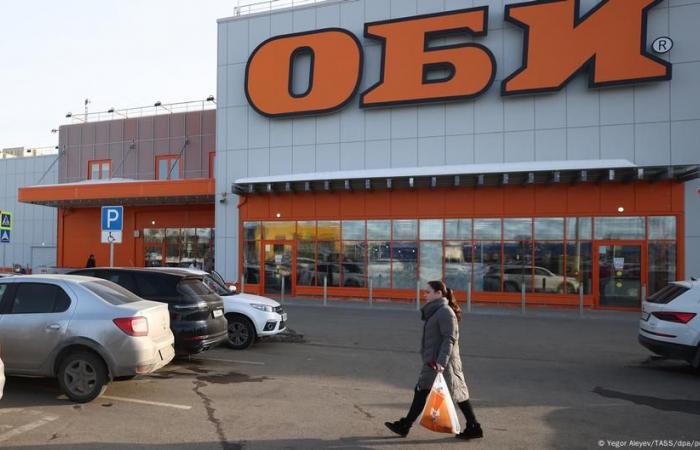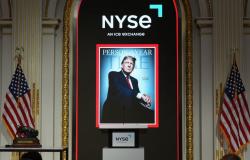According to a study by the kyiv Economy School, more than 460 international companies have ceased their operations in Russia since the beginning of the large -scale invasion of Ukraine in February 2022, by selling or liquidating its assets. Also, 59 global brands have abandoned the Russian market.
Twenty -five of these companies maintain their brands registered in Russia, DW found through the Bappative database, the National Patent Office.
Maintaining the registered trademark means that the names, logos and designs of a brand remain an intellectual property of the company and cannot be used or imitated by third parties.
If someone mentions McDonald’s, they probably think of the famous logo of the golden arches. In the case of Mercedes, it would be the iconic three -pointed star. With Ikea, it is the name of the company in Blue Letters inside a yellow oval.
Companies that maintain their registered trademarks include these, as well as Jaguar, Volvo and many others.
The other 34 companies of the 59 global brands, including the German manufacturer of Henkel consumer and adhesives and the Finnish Fortum energy supplier, have not requested the use of their brands in Russia after February 2022.
Some companies, such as the Unilever and British American and British Assets manufacturer, have transferred the brand rights of some of their products to their old Russian subsidiaries. This formally means that they no longer have any relationship with them.
“The return of Western companies”, “Western companies follow Ariston’s steps and settled in Russia,” “The state Duma is pronounced in favor of the return of Western companies”: the Russian press has been full of headlines like these in recent weeks. The media cite the Bapping website, which shows that companies such as McDonald’s and KFC, which had announced their total withdrawal of Russia, have requested new brands or the expansion of existing brand rights.
The Swedish furniture manufacturer IKEA has been the subject of special scrutiny. In 2022, Ikea condemned the large -scale invasion of Ukraine by Russia. In 2024, he finally left the Russian Federation and sold his latest warehouse in the Moscow region, where he had started his operations in Russia in 2003. However, according to the Rappa database, Ikea has submitted at least four requests for extension of the registration of its brands since February 2022, one of which is still under review.
Who has abandoned his brand?
The other companies included in the List of the kyiv Economy School have not submitted or withdraw their brand registration requests, as Henkel did. This company stopped the procedure to extend its brand rights in 2022 and the current registration expires at the end of this year.
The registration of a brand has a total validity of 10 years and many companies that submitted an application before February 2022 still have time.
The German hardware stores OBI has already requested the brand record in 2021, but was not approved until the end of 2022. Therefore, the company’s intellectual property remains protected for years, at least in theory.
In practice, there may be exceptions. According to Russian legislation, a competitor can legally challenge the right to use a brand “without owner” if it has not been used for three years. In March of this year, the Russian manufacturer of air conditioners Rusklimat made the brand registration of the Swedish company Ericsson declared void before the courts.
Why companies protect their brands
The Russian economist and journalist Jan Melkumov points out that the extension of brand rights is mainly a formal procedure. A request indicates that a company does not want to part with its brands in Russia. “Companies want to prevent third parties from using their brand names. They don’t want to spend money on lawyers or go through a new registration process,” he explained to DW.
According to Melkumov, if companies agreed to repurchase their Russian assets, they can also recover their brands. However, if the buyer has already sold them, the repurchase could take years.
At the same time, Melkumov emphasizes that, given the turbulent political situation and high risks, it is likely that only a few large companies return to Russia. “For them, it is a matter of strategic planning. If the political situation changes in five or ten years, it will be easier to restore their presence,” he told DW.
According to the analyst, the return to the Russian market depends less on the disposition of companies and more on the political situation and the regime in Russia. “Even in favorable conditions, the return will not remember the 1990s,” said Melkumov. “There will not be so much enthusiasm or confidence in Russia as then, people will be cautious.”
The B4ukraine Ukrainian organization, which advocates the isolation of Russia, asked numerous companies about their return plans to the Russian market. McDonald’s and Coca-Cola, two US companies, issued caution statements about it. These were published by B4ukraine.
McDonald’s said the reasons that led the company to retire from Russia in 2022 “are still in force.” Coca-Cola said that “the sanctions and other legal barriers are still valid, which influences any consideration to return to the Russian market.”
Non -western companies fill the void
Russian authorities have established certain criteria for companies that wish to return to the country. According to the RBC website, foreign companies could be forced to guarantee local production, participate in technology transfer and establish joint companies with Russian shareholders.
But for now, none of this is determined. The true beneficiaries of the current situation are Chinese, Indian and Middle East companies, which are actively replacing their western competitors, Melkumov said.
According to a study by the Nikoliers consultant, 27 brands of clothing and footwear from these countries have already replaced 32 Western companies that left the Russian market.
(rr/ers)






